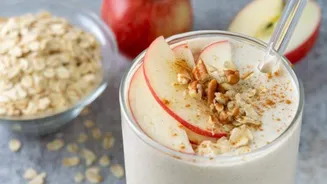Fruits: Nature's Sweetness
Fruits are nature's candy, packed with vitamins, minerals, and antioxidants. They play a crucial role in disease prevention and overall wellness. Whether
it's the Vitamin C in oranges that boosts immunity or the fiber in apples aiding digestion, fruits are a cornerstone of a healthy diet. Fruits are essential for maintaining energy levels and supporting optimal bodily functions. Incorporate a variety of fruits like berries, mangoes, and bananas for a diverse nutrient intake. Fruits are also naturally low in calories and can help manage weight while satisfying your sweet cravings. Fruits can be enjoyed on their own as snacks, added to breakfast, or incorporated in delicious recipes. The key is to consume a colorful array of fruits regularly.
Vegetables: Nutritional Powerhouses
Vegetables, the unsung heroes of a healthy diet, are rich in vitamins, minerals, and fiber, contributing significantly to overall health. Cruciferous vegetables such as broccoli and cauliflower are known for their cancer-fighting properties, while leafy greens like spinach and kale are packed with essential nutrients. Vegetables should make up a substantial portion of your daily meals. Whether you eat them raw, steamed, roasted, or as part of a stir-fry, vegetables offer a wide range of tastes and textures. Experiment with different varieties, from carrots to bell peppers, to ensure a diverse intake of nutrients. The fiber in vegetables also promotes healthy digestion and helps to keep you feeling full, which aids in weight management. Make vegetables a constant in your diet for vitality and disease prevention.
Whole Grains: Sustained Energy
Whole grains are an essential part of a balanced diet, offering sustained energy and vital nutrients. Unlike refined grains, whole grains retain their bran, germ, and endosperm, providing fiber, vitamins, and minerals. Foods like brown rice, quinoa, and oats can regulate blood sugar levels, reduce the risk of heart disease, and aid in weight management. Replacing refined grains, such as white bread and pasta, with whole grains is a simple but impactful change. They keep you feeling fuller for longer. Incorporate whole grains into your breakfast, lunch, and dinner to get the most benefits. From oatmeal to whole-wheat bread, there are several delicious ways to enjoy whole grains and enhance your nutritional intake.
Lean Proteins: Muscle Builders
Lean proteins are essential for building and repairing tissues, and they help you feel full and satisfied. Foods like fish, poultry, beans, and lentils are excellent sources of protein, offering amino acids needed for various bodily functions. Protein helps with muscle maintenance, immunity, and hormone production. Including a protein source with each meal is a good practice. Choose lean cuts of meat and various plant-based protein sources, like tofu and tempeh. Protein is crucial for maintaining muscle mass. Protein rich foods support metabolic health and support healthy body functions. A well-balanced diet containing lean proteins helps to keep you energized and promotes overall health.
Dairy/Alternatives: Calcium Sources
Dairy products and their alternatives are important sources of calcium, vital for strong bones and teeth. Milk, yogurt, and cheese, along with fortified plant-based alternatives like almond milk and soy milk, provide calcium and vitamin D. Dairy products also offer protein, aiding muscle and bone health. Dairy is critical for the development and maintenance of skeletal health. People can experience improved bone density and strength by consuming these food groups regularly. If you're lactose intolerant or prefer plant-based options, consider fortified alternatives to ensure sufficient calcium intake. Including dairy or dairy alternatives in your diet helps support bone health, muscle function, and overall well-being.
Healthy Fats: Essential for Health
Healthy fats are critical for brain function, hormone production, and nutrient absorption. Monounsaturated and polyunsaturated fats, found in avocados, nuts, seeds, and olive oil, are particularly beneficial. These fats help lower bad cholesterol levels and improve heart health. Healthy fats also provide essential fatty acids that the body cannot produce on its own. Eating these foods in moderation supports a well-balanced diet. Avoid or limit trans fats and saturated fats, often found in processed foods and fried items. Healthy fats improve the absorption of fat-soluble vitamins and contribute to overall cell health. Integrate these healthy fats into your diet for optimal body function and well-being.
Legumes: Nutrient Powerhouses
Legumes, including lentils, beans, and peas, are packed with protein, fiber, and essential nutrients. They are excellent for heart health, digestion, and weight management. Legumes are a valuable plant-based source of iron and contribute to various dietary needs. They are also relatively affordable and can be incorporated into many dishes. Consuming legumes is a great way to meet your daily protein and fiber needs. Explore different types of legumes to add variety and nutrients to your diet. Legumes also support gut health and regulate blood sugar. Including legumes in your diet provides benefits for your health.
Nuts and Seeds: Nutrient-Dense Snacks
Nuts and seeds are nutrient-dense snacks providing healthy fats, protein, fiber, vitamins, and minerals. They offer a great balance of nutrients for heart health, cognitive function, and satiety. A handful of nuts and seeds can be a quick, satisfying snack. Nuts and seeds contain essential nutrients. They also help improve metabolism and contribute to overall health. Include a variety of nuts and seeds in your diet to maximize your nutritional intake. They're easy to add to salads, breakfasts, or enjoy as a stand-alone snack. Consuming nuts and seeds contributes to long-term health and well-being.
Herbs and Spices: Flavor Boosters
Herbs and spices are potent additions to your diet, providing flavor and health benefits. They are rich in antioxidants and have anti-inflammatory properties, with some having unique medicinal qualities. Use herbs and spices generously in your cooking to boost the taste and nutrition of your meals. Incorporate them in your daily cooking to elevate your health and create a better food experience. Experimenting with different herbs and spices allows you to vary your nutrient intake and discover new culinary delights. Consuming herbs and spices in moderation contributes to better health and flavor.
Water: The Essential Element
Water is crucial for overall health, supporting almost every bodily function. It aids digestion, transports nutrients, regulates body temperature, and supports waste removal. Drinking enough water each day ensures optimal health and well-being. Dehydration can lead to fatigue, headaches, and other health issues. Consume water throughout the day, and use it as your primary beverage. Proper hydration is essential for maintaining energy levels and supporting metabolic processes. Drinking an adequate amount of water is crucial for a healthy lifestyle, contributing to improved bodily function and overall health.















